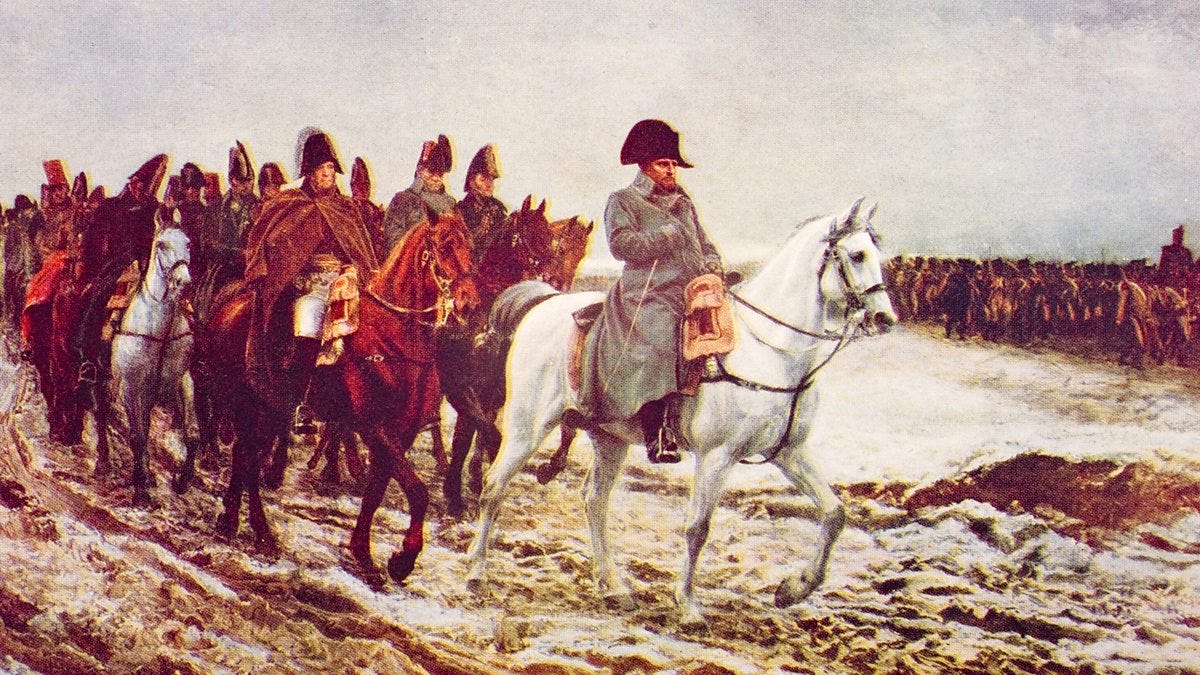Oops
An album of historic blunders
We humans make decisions all the time. Some are bad. Some are very bad. And some are off the charts of hubris and folly.
Below are a handful of great mistakes. No claim is made that these are the worst in history; readers are invited to nominate their own choices.
Two considerations constrain the selection. First, the decision has to have been made by an identifiable individual or group of individuals. The decision to abandon hunting and gathering in favor of an agricultural lifestyle has had enormous ramifications for human history, some of them pernicious. But many thousands of people were involved in the decision and all are lost in the mists of the Neolithic age.
Second, the negative consequences of the bad decision have to have been suffered by the decision makers. Stalin's collectivization campaign destroyed the kulaks but didn't destroy his regime. It was a great crime but not a mistake.
This said, the nominees, in no particular order:
1. Napoleon's invasion of Russia. If the classical Greeks had lived later, or Napoleon earlier, they would have used him as the prime example of hubris. It wasn't enough for him to be emperor of France and the dominant figure in Western Europe; there always had to be another campaign, another victory. Anyone could have told him, and his generals did tell him, that Russia was a morass. The farther into it you got, the harder it was to get out. Until it froze over in winter, by which time you were trapped. Napoleon himself survived, but his army didn’t, and without his army he was just a pushy Corsican.
2. Hitler's invasion of the Soviet Union. (Okay, there is some order to the nominees.) In the spring of 1941, the Third Reich was nearly impregnable. If Hitler had consolidated his gains, it might have lasted many years, if not the thousand he was predicting. His generals told him not to attack Russia. The ghost of Napoleon told him not to. Common sense told him not to. But he did, and the decision brought down his regime and his country.
3. The Dred Scott decision. Roger Taney was frustrated by the inability of Congress and the president to resolve the slavery dispute. So he waded in, relying on the cobwebbed precedent set by John Marshall in Marbury v. Madison, claiming authority for the Supreme Court to negate statutes of Congress. Taney's overturning of the Missouri Compromise transformed moderate Republicans into radicals, and radicals into terrorists.Instead of resolving the slavery dispute, the decision blew it wide open. John Brown's raid on Harpers Ferry became predictable, and after that Southern secession became all but inevitable.
4. Southern secession. Despite the election of Lincoln in 1860, slavery in the South had never been more secure. Lincoln himself was on record as saying the South could maintain slavery as long as it chose. But the planters got greedy. They insisted that slavery be legally allowed to spread into the deserts of the Southwest, where geography and climate decreed a ban more rigid than anything humans could devise. When they didn't get what they wanted, they bolted the Union—and immediately lost the Constitution's protection of their peculiar institution. Lincoln’s defense of the Union ineluctably evolved into a fight against slavery. Secession was doomed, and so was slavery.
5. Prohibition in the United States. In a democracy it’s nearly impossible to enforce a law millions of people consider stupid and illegitimate. The prohibitionists tried. They exploited a curious confluence of progressive social engineers, religious foes of demon rum, and nativist and laborist opponents of immigration to leverage the overrepresentation of rural America into a constitutional amendment that must have made James Madison turn in his grave. The opponents of prohibition had never in decades been so successful in making the idea unpopular as the proponents were within a few years of its enactment. When it died before its fifteenth birthday, none were left to mourn it.
That’s enough folly for today. More coming. Nominate your own—or object to these.


Great examples all, in the comments! Keep them coming.
I nominate the U.S. war in Vietnam. It is one of the greatest historical blunders of United States foreign and military policy. Even though the U.S. had been increasingly involved in Vietnam since the mid 1950s it was Lyndon Johnson, Secretary of Defense Robert McNamara, and other military advisors that escalated U.S. actions in Vietnam to a full occupation of South Vietnam. The war ended with the defeat of U.S. efforts to prevent all of Vietnam from falling into Communist rule. The cost was great to U.S. international prestige and its economy. It resulted in over 58,000 American military casualties and eroded citizens' trust in the U.S. government. The Vietnam war tarnished the legacy of President Johnson who otherwise had made a great impact through his Great Society policies and the signing of ground breaking civil rights legislation.